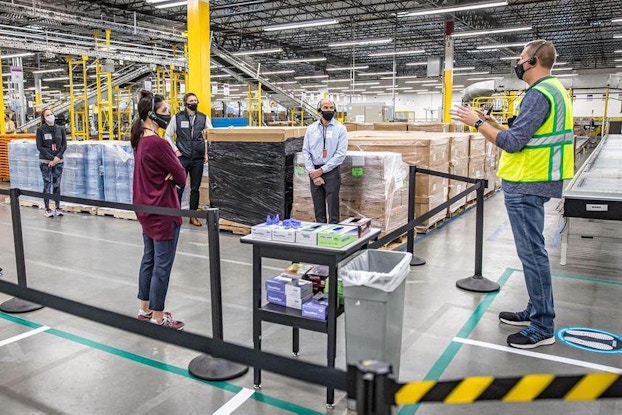Over the past year, many small businesses across multiple industries have had to quickly pivot and reimagine the ways in which they connect with customers — from ensuring safe physical workspaces for employees to ramping up their e-commerce presence and shifting to online sales.
Now more than ever, in the age of social distancing and home delivery, sellers are challenged with finding new ways to meet customers' needs online. But as Jennifer Kuznicki, Senior Program Manager, Small Business Empowerment at Amazon, points out, online selling isn't a business plan on its own.
"You still need to understand your customer," she said. "You still need to understand great sourcing for your raw products or materials and [to have] good marketing acumen."
“At Amazon, supporting small and medium-sized businesses is a fundamental part of our work and an extension of our customer-centric culture. Our success depends on their success,” said Kuznicki.
That's why Amazon launched Amazon Small Business Academy, a program that empowers small business owners to be "successful sellers, authors, makers, service professionals and delivery service providers."


This has been a challenging year for many small businesses, yet selling in Amazon’s stores has enabled hundreds of thousands of smaller companies to sustain and even grow their sales despite the COVID-19 crisis and beyond.
“Due to COVID, we are seeing these businesses get really creative about how they can still bring that thing that makes them special, to a larger audience,” said Kuznicki.
According to Amazon, more than half of all items sold in its online store come from independent businesses — most of which are small and medium-sized businesses and entrepreneurs. Amazon Small Business Academy aims to help those businesses grow and reach millions of customers around the world.
"[The Academy] is a new way to think about your entrepreneurial journey," said Kuznicki, who runs the Small Business Academy program.
During a recent tour and roundtable discussion at an Amazon fulfillment center in Shakopee, Minnesota, Amazon gave local small business owners and U.S. Chamber of Commerce members a behind-the-scenes tour of its operations. The tour featured best practices for businesses of all sizes to keep their employees healthy and safe, and showed the innovative technologies and people who come together every day to pick, pack, ship and deliver thousands of customer orders.
Small business sellers were able to see firsthand how their own products are carefully stowed and moved throughout the fulfillment process by people and robotics and managed through a visual system which allows for their items to be available for millions of customers globally. At the roundtable, Kuznicki shared details about Amazon Small Business Academy with the group and answered questions about how sellers can easily incorporate selling online into their overall business plan and the tools available to be successful.

What is Amazon Small Business Academy?
Amazon Small Business Academy provides a range of educational initiatives to help entrepreneurs, startups and business owners succeed online. The program helps small businesses — and mentors — harness the power of the internet to reach more customers, build their brand and grow sales.
The Amazon Small Business Academy program also offers a virtual boot camp, called Amazon Pathways, to help current and aspiring small business owners gain digital skills. The online seminars provide best practices for successful selling in Amazon stores and include live Q&A with experts. Webinars also include live demonstrations and expert guest presenters, as well as immersive eight-week virtual bootcamps for online sellers.
“Customers have changed buying habits, and many companies have had to curtail their operations or even close. Yet smaller companies have continued to grow with Amazon, despite the crisis,” said Kuznicki. “Since the pandemic hit, third-party sellers have had record sales on Amazon. Their products continue to account for more than 50% of all items sold in our online stores, and their sales continue to outpace our first-party sales.”
In 2020, Amazon invested $18 billion in logistics, tools, services, programs and people to help small and medium-sized business sellers succeed. "This content is available to everyone," Kuznicki said. "We host educational experiences that go beyond a one-sided conversation and dig deeper into business acumen."
Customers have changed buying habits, and many companies have had to curtail their operations or even close. Yet smaller companies have continued to grow with Amazon, despite the crisis.
Jennifer Kuznicki, Senior Program Manager, Small Business Empowerment, Amazon
Who can benefit from Amazon Small Business Academy?
Amazon Small Business Academy is, of course, an excellent resource for online sellers who are marketing physical products to Amazon's customer base. However, this program can also benefit entrepreneurs with other types of business models, including:
- Authors who self-publish and sell e-books on Kindle.
- Professional service providers, like handymen, house cleaners and trade professionals, who want to reach a wider online audience.
- Delivery drivers who want to partner with e-commerce sellers.
- Tech builders who want to create amazing technology experiences through the Amazon app store, AWS Marketplace and Alexa Skills.
Amazon Small Business Academy isn't just for beginners. Even entrepreneurs who are already partnering with Amazon can benefit from the webinars, events and resources offered through this program.
“We found that a lot of people who had been [selling] on Amazon for quite a while were finding new and interesting ways of doing business and reaching customers, just in getting together and talking about these things," said Kuznicki.

How to provide value online as a small business
Through the resources offered by Amazon Small Business Academy, small business owners who relied on in-person customer relationships before the pandemic can learn to pivot toward ancillary digital and physical products that still deliver the value and expertise their customers have come to expect.
For example, said Kuznicki, a local fishmonger might have chatted with customers in store and provided tricks, tips and recommendations for preparing their fish at home. To make up for the lower volume of in-person transactions, the fishmonger might create and package a custom spice blend and sell it to customers directly on Amazon, or write an e-book about the best local fishing spots to publish and sell through Kindle.
"This is a great opportunity to learn and explore new things, or as we say at Amazon, 'learn and be curious,'" said Kuznicki. "It's always about finding out the next new thing."
Kuznicki noted that providing this type of extra value could give small sellers an edge over their competitors, even the big brands that can afford to sell similar products at lower prices.
"We offer a lot of tools and opportunities to do that," she added. "All of that expertise, all of that care — that's the difference [with small businesses], if you have that on Amazon, you can make the best of both worlds."
In 2020, Amazon hosted over 1,000 educational events for small and medium-sized businesses around the world, with more than 150,000 attendees, through programs like Amazon Small Business Academy. As part of Amazon’s ongoing investments in its sellers’ success, the company has committed to supporting and educating 500,000 U.S. SMBs and onboarding 100,000 new U.S. sellers over the next 12 months.
Learn more about Amazon Small Business Academy and sign up for upcoming webinars here.




